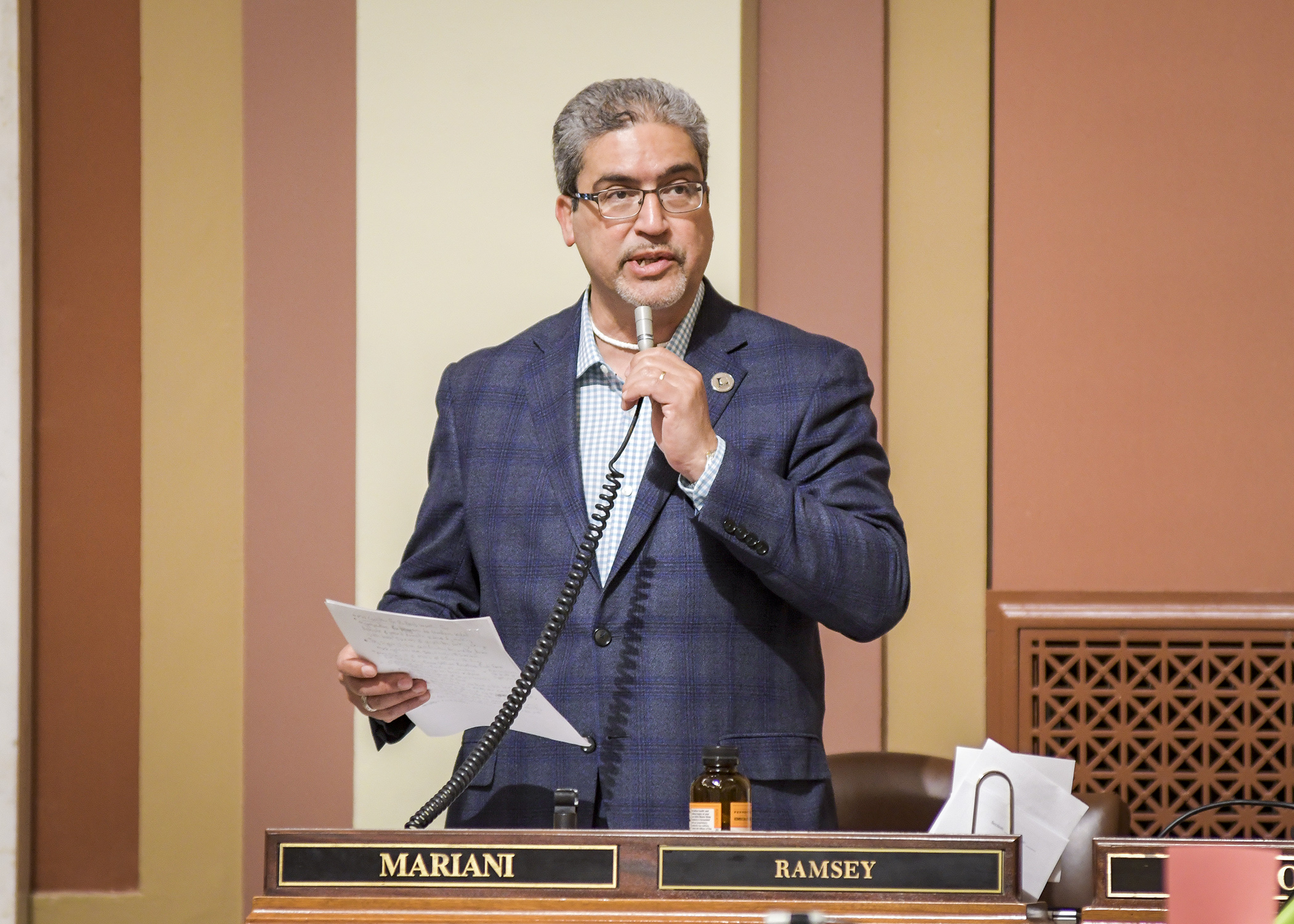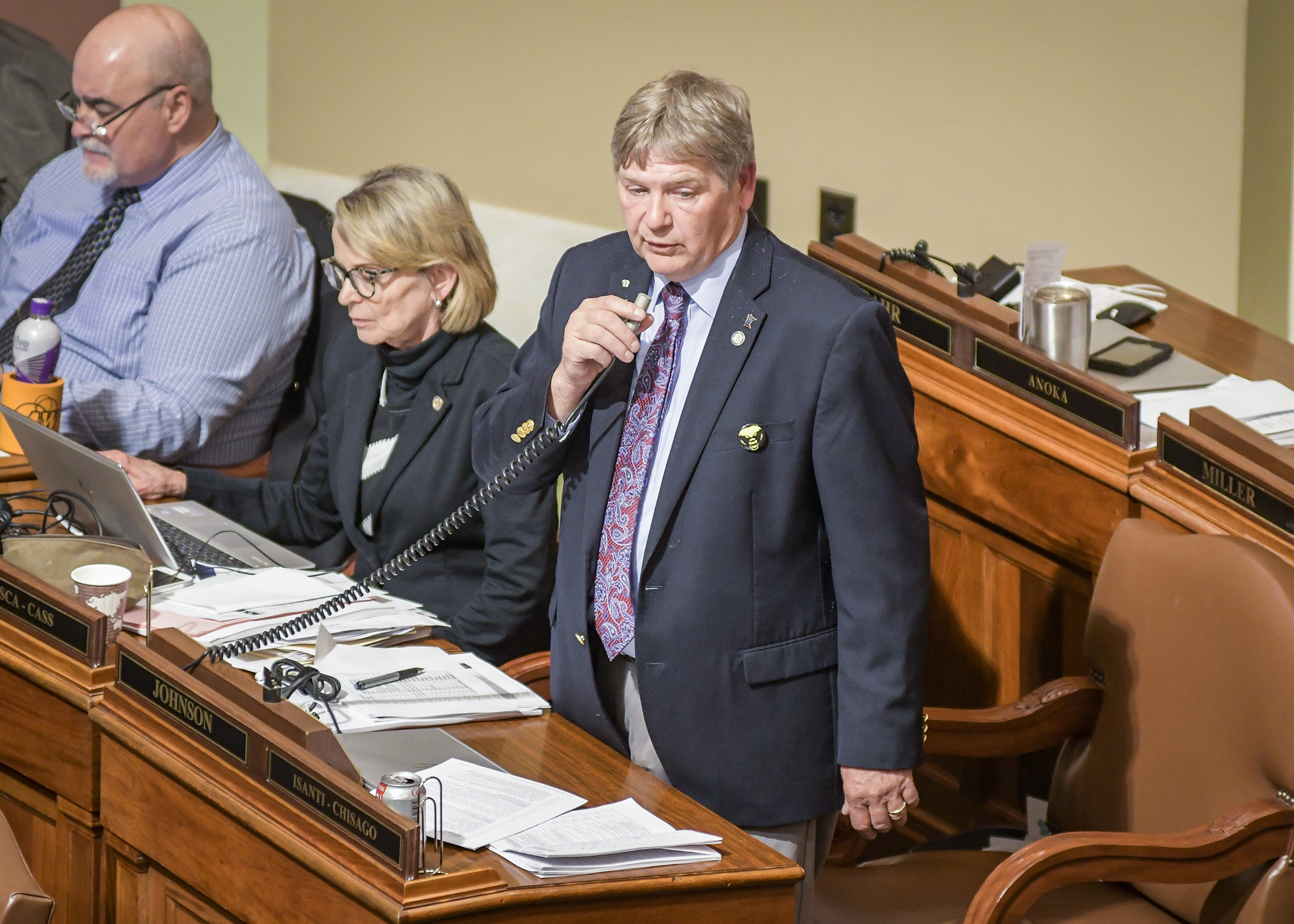Late-night legislating: Gun provisions remain in omnibus public safety bill passed in wee hours

It took seven hours Monday night and into the early-morning hours of Tuesday, but the House passed its omnibus public safety bill 70-64. It is the first of the omnibus House bills to receive body approval in the pre-dawn darkness.
Sponsored by Rep. Carlos Mariani (DFL-St. Paul) and Sen. Warren Limmer (R-Maple Grove), HF2792/SF802*, as amended to include the House language, now returns to the Senate, which passed its version 44-23 on April 24. A conference committee is expected to try and resolve the differences.
The 296-page omnibus bill (plus a 39-page appendix) would appropriate $2.79 billion in the 2020-21 biennium to fund corrections, public safety programs and courts across the state.
“Providing for the public safety is one of the most important functions of government,” Mariani said. “It is truly my honor to present a comprehensive bill that seeks to do just that with strong reform, strong accountability and a robust investment in our public safety, corrections and judiciary system.”
Background checks and ‘red flag’ provisions remain
Two DFL-sponsored gun-control provisions are in the final product, which caused many Republican members to vote against the bill, even though it contained public safety measures they support.
Rep. Matt Grossell (R-Clearbrook) said that the omnibus bill was “badly poisoned” by the gun provisions, and House Minority Leader Kurt Daudt (R-Crown) said the bill “will not keep Minnesotans safe.”
Both echoed the concerns of fellow Republicans who said the gun-control provisions would violate the right to bear arms guaranteed in the 2nd Amendment, protection against unreasonable search and seizure guaranteed by the 4th Amendment and the right to due process guaranteed by the 5th Amendment.
Based off HF8, sponsored by Rep. Dave Pinto (DFL-St. Paul), one provision would require a buyer background check for transfer of a pistol or semiautomatic military-style assault weapon, including those among private parties. Some exceptions would be provided for, such as a transfer involving a firearms dealer or law enforcement agency, an exchange between immediate family members or a temporary transfer if it “is necessary to prevent imminent death or great bodily harm.”
Based off HF9, sponsored by Rep. Ruth Richardson (DFL-Mendota Heights), another bill provision would permit law enforcement and city or county attorneys to petition a court for an extreme risk protection order to prohibit someone from possessing a firearm for between six months and two years if they pose a “significant danger” to themselves or others by possessing a firearm.
No amendments offered by Republicans to substantially change those provisions prevailed.
However, Rep. Jim Nash (R-Waconia) successfully offered an amendment to require the Public Safety Department to “study the issue of convictions of prohibited persons in possession of firearms and how the prohibited persons obtained possession of the firearms.” An amendment to the amendment pushed the report’s due date to the Legislature to Dec. 15, 2020.
Opposition to each gun-control provision is likely to be fierce in the Republican-controlled Senate, whose companion omnibus judiciary and public safety bill does not contain any background check language. Senate Majority Leader Paul Gazelka (R-Nisswa) has indicated no appetite for the bills among his caucus members.
More policy
Among its other policy provisions, the bill would re-establish the Ombudsman for Corrections, require police departments to develop written policies for investigating sexual assault cases, establishing a task force to reform the criminal state criminal statute to ensure they hold criminals accountable, increase penalties for child pornography, eliminate the existing statute of limitations for sex trafficking and other criminal sexual conduct offenses and strives for probation reform by transformative work that produces redemptive opportunities.
 Rep. Brian Johnson presents an amendment to the omnibus public safety finance bill on the House Floor April 29. Photo by Andrew VonBank
Rep. Brian Johnson presents an amendment to the omnibus public safety finance bill on the House Floor April 29. Photo by Andrew VonBank“The ombudsmen bill is probably the most significant improvement in the prison system … I see that as both a resource for the staff and the residents and the staff to improve communication,” said Rep. Jack Considine Jr. (DFL-Mankato), who chairs the House Corrections Division.
With approximately 45 openings for correctional officers, an amendment from Rep. Marion O'Neill (R-Maple Lake) to increase the minimum starting salary for correctional officers to $19.95 per hour was rejected. Rep. Nick Zerwas (R-Elk River) said county jailers often earn more than that.
Considine wanted to support the change, but noted that is something that would need to be negotiated through collective bargaining. “We’ll keep an eye on it and continue to work on it,” he said.
Zerwas also was unsuccessful with an amendment that would make it a gross misdemeanor to knowingly falsely report a crime motivated by bias.
Rep. Kelly Moller (DFL-Shoreview) said it’s already illegal to falsely report a crime. “Hate crimes are often less likely to be reported by victims in the first place. By enhancing penalties for falsely reporting a hate crime there’s a strong potential for chilling victims of crime from reporting.”
Other provisions include funding 911 dispatcher CPR training, establishing a Cannabis Task Force, establishing a Task Force on Missing and Murdered Indigenous Women, change the definition of fifth-degree sexual conduct to include touching of the clothing covering the immediate area of the buttocks, and prohibit the Department of Corrections from entering into a contract with privately owned and operated prisons to care for state inmates.
The latter is directed at a privately owned prison in the west-central part of the state. The facility has been vacant since 2010, but supporters note has been maintained.
Rep. Tim Miller (R-Prinsburg) unsuccessfully offered — then withdrew — an amendment to have the department, in order to address capacity shortfalls, “enter into a contract either to purchase and operate or to lease-to-own and operate an existing prison facility located in Appleton, Minnesota. The commissioner shall attempt to conclude negotiations by January 1, 2020."
Where the money would go
Over the 2020-21 biennium, the House bill would fund the Department of Corrections at $1.29 billion, the state’s judicial system at $1.05 billion and the Department of Public Safety at $404.93 million.
[MORE — View the spreadsheet]
Selected appropriations, by government unit, are below.
Corrections ($1.29 billion):
- $9.19 million for prison security upgrades;
- $8.5 million to hire an additional 110 prison correctional officers;
- $8 million for staffing recruitment and retention;
- $5.34 million to maintain full funding of the offender health care contract; and
- $1.8 million to re-establish a prison ombudsman office that was eliminated in 2003.
Judiciary ($1.05 billion):
- $632.34 million to fund district courts, including a 4 percent pay raise for judges;
- $211.67 million to the state’s public defender office;
- $88.47 million to fund the Supreme Court, including a 3 percent pay raise for judges;
- $44.54 million to the Guardian ad Litem Board;
- $26.14 million to fund appeals courts, including a 3 percent pay raise for judges; and
- $13.12 million to fund the Department of Human Rights, including 17 new employees.
Public Safety ($404.93 million):
- $155.55 million to fund statewide emergency communication networks;
- $126.2 million to fund the Bureau of Criminal Apprehension;
- $82.92 million to fund Office of Justice Programs;
- $10.44 million to fund Homeland Security and Emergency Management; and
- $500,000 to fund a Minnesota School Safety Center.
“What we hear time and time again is that budgets are moral documents and I am proud of the budget we put together,” said Rep. John Lesch (DFL-St. Paul). He chairs the House Judiciary Finance and Civil Law Division.
Combined omnibus bill could be split apart
The House Ways and Means Committee merged the public safety and judiciary bills April 11.
House Speaker Melissa Hortman (DFL-Brooklyn Park) said at a Monday news conference the state would be better served if the judiciary and public safety provisions were separated and sent to separate conference committees. She and other DFL leaders plan to lobby Limmer to make that separation.
Also added to the omnibus public safety finance bill was the disaster assistance contingency account bill, HF2611, sponsored by Rep. Gene Pelowski Jr. (DFL-Winona). That bill would transfer $10 million in each year of the 2020-21 biennium from the General Fund to the disaster assistance contingency account, which is money available to fund responses to disasters immediately and without further legislative action.
— Assistant Director/Editor Mike Cook contributed to this story
Related Articles
Search Session Daily
Advanced Search OptionsPriority Dailies
Ways and Means Committee OKs proposed $512 million supplemental budget on party-line vote
By Mike Cook Meeting more needs or fiscal irresponsibility is one way to sum up the differences among the two parties on a supplemental spending package a year after a $72 billion state budg...
Meeting more needs or fiscal irresponsibility is one way to sum up the differences among the two parties on a supplemental spending package a year after a $72 billion state budg...
Minnesota’s projected budget surplus balloons to $3.7 billion, but fiscal pressure still looms
By Rob Hubbard Just as Minnesota has experienced a warmer winter than usual, so has the state’s budget outlook warmed over the past few months.
On Thursday, Minnesota Management and Budget...
Just as Minnesota has experienced a warmer winter than usual, so has the state’s budget outlook warmed over the past few months.
On Thursday, Minnesota Management and Budget...